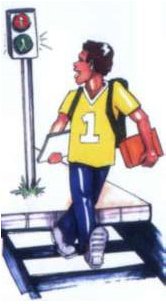New Gadget Helps Blind Cross City Roads Safety
When they spin in the hands of blind or partially sighted pedestrians, it is safe to cross. Each cone costs £250 (about R3 000) to install and at least 400 are to be fitted at pelican crossings around Glasgow in the next few months. Further cones will be fitted at other road crossings and near junctions as part of a rolling programme. They will be installed at all new traffic signals as a matter of course. Council roads operations manager, Bob Thomson, explained why the programme had been adopted. "They are being installed because they are part of a new national standard for traffic signals and have to be fitted. Rather than having audible signals, it has been found it is safer to have these cones." "Most delivery vehicles now have reversing bleepers, which are similar to the sound of crossing bleepers. A blind person could misconstrue those for a crossing signal, so it was decided they were too dangerous and need replacing." One hundred of the crossing aids are already in place in and around Glasgow. The council is liaising with various bodies that serve the visually handicapped to identify the most suitable locations. Mike Cairns, director of the Royal National Institute of the Blind, Scotland, said: "Our research shows that negotiating traffic and crossing roads are major problems for blind and partially sighted people." "Any measure which will help the 180 000 people in Scotland with serious sight problems to take part safely in everyday activities which the rest of us take for granted, is bound to be of benefit." The cost of the operation has been paid for with the help of a £50 000 Scottish Executive grant. (From Evening Times Online)
Related TopicThe blind: How to lend them a helping hand
|
 A
new device to help the visually handicapped cross roads in Glasgow,
Scotland, in safety, is being installed at a cost of £100 000 (about
R1,2-m). The small, grooved rotating devices are being attached to the
underside of push-button panels at pelican crossings (pedestrian crossing
with traffic lights operated by pedestrians).
A
new device to help the visually handicapped cross roads in Glasgow,
Scotland, in safety, is being installed at a cost of £100 000 (about
R1,2-m). The small, grooved rotating devices are being attached to the
underside of push-button panels at pelican crossings (pedestrian crossing
with traffic lights operated by pedestrians).